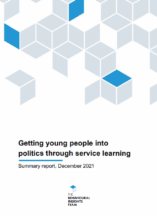Key findings
- Young people #vote, petition & protest less than any other age group in the UK. So what can we do to get #GenZ involved in the political process? New research from BIT, @uclspp & @NCSTrust found that participating in volunteering can boost political activism by 12% in young people. 🗳️ Tweet
- New BIT research by @paddjt finds that service learning programmes like @NCS can have a big positive effect on young people’s political participation. #youth #participation Tweet
- Young people who do @ncs are more likely to vote and campaign! New research from @paddjt out today. Tweet
Young people participate in politics less than any other age group, and they arguably suffer materially as a result. Service learning, a type of civic education, is one policy that has received a substantial amount of public investment in an attempt to solve this problem. However, the evidence to date on its effect, how this effect is produced, and how we might maximise it, has been lacking.
This report offers a summary of a mixed methods PhD thesis that attempts to address these gaps in our knowledge. The research was carried out by Dr. Patrick Taylor from the Behavioural Insights Team, with support from the National Citizen Service Trust (NCS Trust). The findings from this research suggest that:
- service learning (and NCS as an example) can have a large positive effect on political participation;
- this effect is partly produced by an increased sense of social self-efficacy; and
- social mixing and practical mastery experiences are crucial components of the intervention to achieve these effects.




